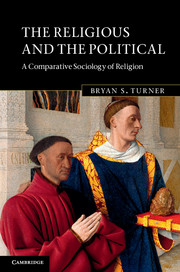Book contents
- Frontmatter
- Contents
- Acknowledgements
- Introduction
- Part I The religious and the political
- Part II State management of religion
- 4 Religion and kingship: liturgies and royal rituals
- 5 Religion and reproduction: marriage and family
- 6 Conversion and the state
- 7 Religion, state and legitimacy: three dimensions of authority
- Part III Comparative and historical studies
- Part IV Conclusion
- References
- Index
5 - Religion and reproduction: marriage and family
Published online by Cambridge University Press: 05 April 2013
- Frontmatter
- Contents
- Acknowledgements
- Introduction
- Part I The religious and the political
- Part II State management of religion
- 4 Religion and kingship: liturgies and royal rituals
- 5 Religion and reproduction: marriage and family
- 6 Conversion and the state
- 7 Religion, state and legitimacy: three dimensions of authority
- Part III Comparative and historical studies
- Part IV Conclusion
- References
- Index
Summary
Introduction: sex and death
Individual decisions to marry and to create a family are, from a liberal point of view, supremely private matters, and in modern societies where such decisions are clothed in a romantic language of love and fidelity they appear to belong exclusively to the private sphere. In reality, social conventions have largely determined whom we marry and under what circumstances. Because marriage has important consequences for the economics of households, in traditional societies these decisions were often determined by the kinship group. Marriages represented important alliances between families, and hence in many societies cross-cousin marriages were preferred. Before the rise of modern individualism and the related notion that marriage involves a romantic attachment, marriage was typically regarded as a secular contract in which there were mutual obligations and entitlements. These contracts were not simply between individuals but between families. The logic of dowry is to reinforce the presence of these contractual obligations. In these contractual negotiations, the social status of the woman meant that rights and obligations were characteristically uneven. Given the unequal relationship between men and women within the wider society, women have typically found it difficult to enforce their claims on divorce. To guard against such eventualities, many marriage systems allow for pre-nuptial agreements that anticipate the complexities of divorce. In short, the idea that choosing a spouse is simply a matter of individual choice is sociologically unrealistic. In many societies the state can also intervene to determine who is an eligible or lawful partner by for example creating laws that prohibit or regulate inter-faith marriages. Indonesia is a good example. Despite these objective constraints on marriage as an institution, it is overlaid with romantic conventions in which the marital union is grounded, not in contract or an exchange of economic resources, but in a personal and emotional decision.
- Type
- Chapter
- Information
- The Religious and the PoliticalA Comparative Sociology of Religion, pp. 101 - 118Publisher: Cambridge University PressPrint publication year: 2013



